论文:英语中的动物习语
- 格式:doc
- 大小:46.00 KB
- 文档页数:5
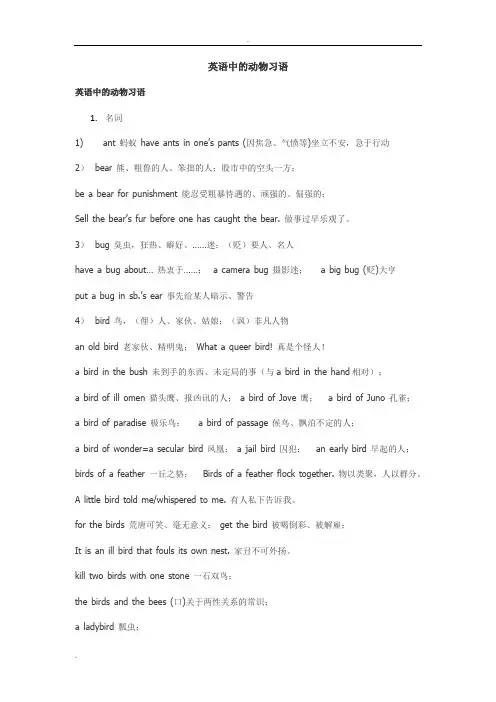
英语中的动物习语英语中的动物习语1.名词1) ant 蚂蚁have ants in one’s pants (因焦急、气愤等)坐立不安,急于行动2)bear 熊、粗鲁的人、笨拙的人;股市中的空头一方;be a bear for punishment 能忍受粗暴待遇的、顽强的、倔强的;Sell the bear’s fur before one has caught the bear. 做事过早乐观了。
3)bug 臭虫,狂热、癖好、……迷;(贬)要人、名人have a bu g about… 热衷于……; a camera bug 摄影迷; a big bug (贬)大亨put a bug in sb.’s ear 事先给某人暗示、警告4)bird 鸟,(俚)人、家伙、姑娘;(讽)非凡人物an old bird 老家伙、精明鬼;What a queer bird! 真是个怪人!a bird in the bush 未到手的东西、未定局的事(与a bird in the hand相对);a bird of ill omen 猫头鹰、报凶讯的人;a bird of Jove 鹰; a bird of Juno 孔雀;a bird of paradise 极乐鸟; a bird of passage 候鸟、飘泊不定的人;a bird of wonder=a secular bird 凤凰;a jail bird 囚犯;an early bird 早起的人;birds of a feather 一丘之貉;Birds of a feather flock together. 物以类聚,人以群分。
A little bird told me/whispered to me. 有人私下告诉我。
for the birds 荒唐可笑、毫无意义;get the bird 被喝倒彩、被解雇;It is an ill bird that fouls its own nest. 家丑不可外扬。
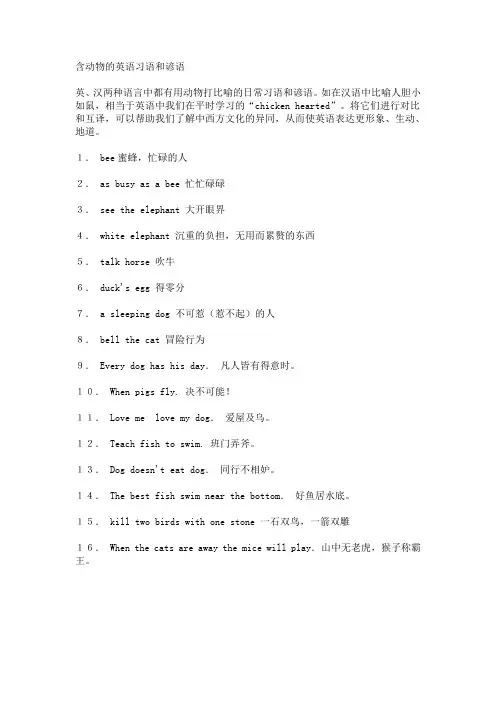
含动物的英语习语和谚语
英、汉两种语言中都有用动物打比喻的日常习语和谚语。
如在汉语中比喻人胆小如鼠,相当于英语中我们在平时学习的“chicken hearted”。
将它们进行对比和互译,可以帮助我们了解中西方文化的异同,从而使英语表达更形象、生动、地道。
1. bee蜜蜂,忙碌的人
2. as busy as a bee 忙忙碌碌
3. see the elephant 大开眼界
4. white elephant 沉重的负担,无用而累赘的东西
5. talk horse 吹牛
6. duck's egg 得零分
7. a sleeping dog 不可惹(惹不起)的人
8. bell the cat 冒险行为
9. Every dog has his day.凡人皆有得意时。
10. When pigs fly. 决不可能!
11..爱屋及乌。
12. Teach fish to swim. 班门弄斧。
13. Dog doesn't eat dog.同行不相妒。
14. The best fish swim near the bottom.好鱼居水底。
15. kill two birds with one stone 一石双鸟,一箭双雕
16. When the cats are away the mice will play.山中无老虎,猴子称霸王。
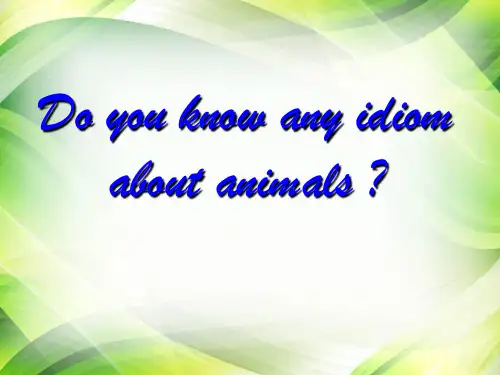
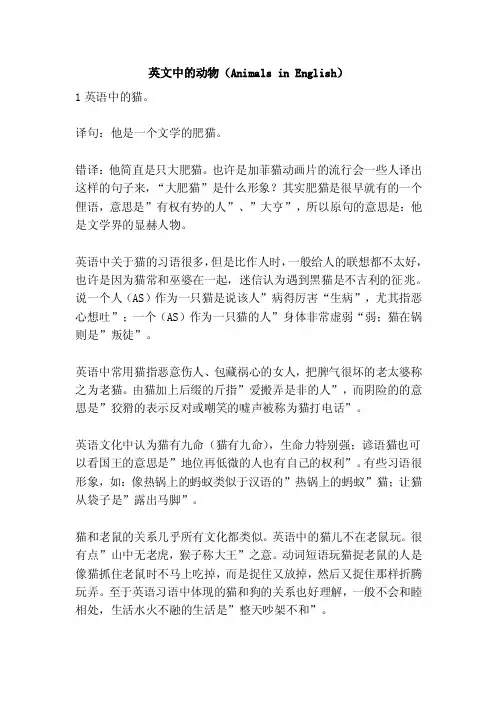
英文中的动物(Animals in English)1英语中的猫。
译句:他是一个文学的肥猫。
错译:他简直是只大肥猫。
也许是加菲猫动画片的流行会一些人译出这样的句子来,“大肥猫”是什么形象?其实肥猫是很早就有的一个俚语,意思是”有权有势的人”、”大亨”,所以原句的意思是:他是文学界的显赫人物。
英语中关于猫的习语很多,但是比作人时,一般给人的联想都不太好,也许是因为猫常和巫婆在一起,迷信认为遇到黑猫是不吉利的征兆。
说一个人(AS)作为一只猫是说该人”病得厉害“生病”,尤其指恶心想吐”;一个(AS)作为一只猫的人”身体非常虚弱“弱;猫在锅则是”叛徒”。
英语中常用猫指恶意伤人、包藏祸心的女人,把脾气很坏的老太婆称之为老猫。
由猫加上后缀的斤指”爱搬弄是非的人”,而阴险的的意思是”狡猾的表示反对或嘲笑的嘘声被称为猫打电话”。
英语文化中认为猫有九命(猫有九命),生命力特别强;谚语猫也可以看国王的意思是”地位再低微的人也有自己的权利”。
有些习语很形象,如:像热锅上的蚂蚁类似于汉语的”热锅上的蚂蚁”猫;让猫从袋子是”露出马脚”。
猫和老鼠的关系几乎所有文化都类似。
英语中的猫儿不在老鼠玩。
很有点”山中无老虎,猴子称大王”之意。
动词短语玩猫捉老鼠的人是像猫抓住老鼠时不马上吃掉,而是捉住又放掉,然后又捉住那样折腾玩弄。
至于英语习语中体现的猫和狗的关系也好理解,一般不会和睦相处,生活水火不融的生活是”整天吵架不和”。
大家都知道倾盆大雨是”大雨倾盆”的意思,但是这一说法的来源至今仍有不同意见,一说源自古代斯堪的那维亚神话:雨中巫婆骑着猫通过,而雨神乘的是一条狗。
还有一个说法:古代街道排水设施太差,一下大雨,许多猫和狗都被淹死,雨水流走后,街上满是猫和狗的尸体。
第三个说法是该成语来自希腊文的catadupe,意为”瀑布”,下瓢泼大雨时犹如瀑布,后来慢慢演变成了倾盆大雨。
2。
母牛的快乐?译句:他现在像牛一样快乐。
解释:按字面意思是”他现在像母牛一样快乐。
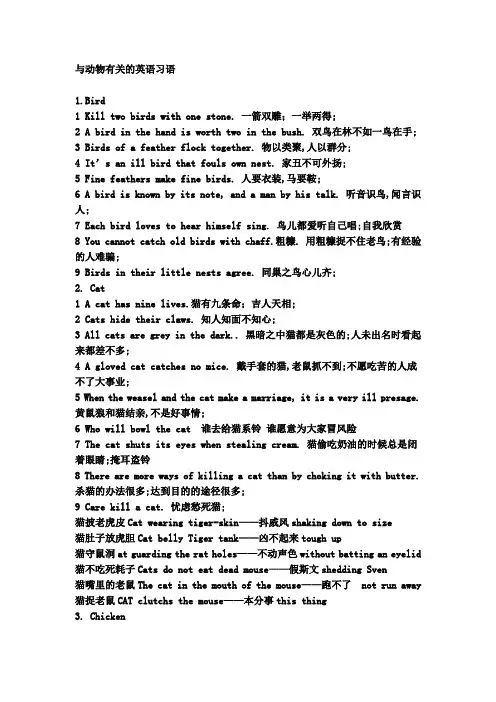
与动物有关的英语习语1.Bird1 Kill two birds with one stone. 一箭双雕;一举两得;2 A bird in the hand is worth two in the bush. 双鸟在林不如一鸟在手;3 Birds of a feather flock together. 物以类聚,人以群分;4 It’s an ill bird that fouls own nest. 家丑不可外扬;5 Fine feathers make fine birds. 人要衣装,马要鞍;6 A bird is known by its note, and a man by his talk. 听音识鸟,闻言识人;7 Each bird loves to hear himself sing. 鸟儿都爱听自己唱;自我欣赏8 You cannot catch old birds with chaff.粗糠. 用粗糠捉不住老鸟;有经验的人难骗;9 Birds in their little nests agree. 同巢之鸟心儿齐;2. Cat1 A cat has nine lives.猫有九条命;吉人天相;2 Cats hide their claws. 知人知面不知心;3 All cats are grey in the dark.. 黑暗之中猫都是灰色的;人未出名时看起来都差不多;4 A gloved cat catches no mice. 戴手套的猫,老鼠抓不到;不愿吃苦的人成不了大事业;5 When the weasel and the cat make a marriage, it is a very ill presage. 黄鼠狼和猫结亲,不是好事情;6 Who will bowl the cat 谁去给猫系铃谁愿意为大家冒风险7 The cat shuts its eyes when stealing cream. 猫偷吃奶油的时候总是闭着眼睛;掩耳盗铃8 There are more ways of killing a cat than by choking it with butter. 杀猫的办法很多;达到目的的途径很多;9 Care kill a cat. 忧虑愁死猫;猫披老虎皮Cat wearing tiger-skin——抖威风shaking down to size猫肚子放虎胆Cat belly Tiger tank——凶不起来tough up猫守鼠洞at guarding the rat holes——不动声色without batting an eyelid 猫不吃死耗子Cats do not eat dead mouse——假斯文shedding Sven猫嘴里的老鼠The cat in the mouth of the mouse——跑不了 not run away 猫捉老鼠CAT clutchs the mouse——本分事this thing3. Chicken1 Don’t count your chickens before they’re hatched. 鸡蛋未孵出,先别数小鸡;不要过早乐观;4. Crow1 A crow is never the whiter for washing herself often. 江山易改,本性难移;5. Dog1 He who would hang his dog gives out first that it is mad. 欲加之罪,何患无词.2 A staff is quickly found to beat a dog with. 欲加之罪,何患无词.3 Love me, love my dog. 爱屋及乌.4 Too much pudding will choke a dog. 布丁太多噎死狗;5 Every dog has his day. 人人皆有得意时;6 Barking dogs don’t seldom bite. 爱叫的狗很少咬人;7 Let sleeping dogs lie. 勿惹事生非;8 Dead dogs bite not. 死狗不咬人;9 All are not thieves that dogs bark at. 狗见了叫的不一定都是贼;不要以貌取人;10 Every dog is a lion at home. 狗在家门口就成了狮子;11 Don’t be a dog lying in the manger. 莫学狗占马槽不吃草;不要占着茅坑不拉屎;12 Dog does not eat dog. 同类不相残;13 Scornful dogs will eat dirty puddings. 狗再傲慢也会吃脏布丁;14 A son never thinks his mother ugly,and a dog never shuns its owner’s home however shabby it is.儿不嫌母丑,狗不嫌家贫;6. Frog1 The frog in the well knows nothing of the great ocean. 井底之蛙,不知大海;7. Fox1 The fox may grow grey, but never good. 狐狸毛色可变灰,但是本性难移;2 The fox preys farthest from his hole. 狐狸捕食,远离洞府;兔子不吃窝边草;3 When the fox preaches, then take care of your geese. 每当狐狸说教,当心鹅群被盗;4 When the fox says he is a vegetarian, it’s time for the hen to look out. 狐狸说它吃素的时候,母鸡就得注意;英语中有关动物的谚语下8. Fish1 The best fish swim near the bottom. 好鱼常在水底游;2 Never offer to teach fish to swim. 不要班门弄斧;3 Go to the sea, if you would fish well. 不入虎穴,焉得虎子;4 There’s as good fish in the sea as ever came out of it. 海里的好鱼多的是;5 It is a silly fish that is caught twice with the same bait. 智者不上两次档;6 If water is noisy, there are no fish in it. 咆哮的水中无鱼;夸夸其谈者无真才实学;;9. Hare1 You cannot run with the hare and hunt with the hounds猎狗. 不能既和野兔一起跑又和猎狗一起追;人不应两面讨好;2 The tortoise wins the race while the hare is sleeping. 兔子睡懒觉,乌龟跑赢了;10. Horse1 You can take a horse to the water, but you can’t make him drink. 带马到河边容易,逼马饮水难;2 Don’t ride the high horse. 勿摆架子;3 A good horse cannot be of a bad colour. 好马不会毛色差;4 A horse may stumble on four feet. 马有四条腿,亦有失蹄时;5 A running horse needs no spur. 奔马无需鞭策;6 Don’t put the cart before the horse. 不要将大车套在马前面;处理问题应按先后次序,不要本末倒置;7 The common horse is worst shod. 公用之马,掌子最差;8 Lock the barn door after the horse is stolen. 失马之后锁马厩;亡羊补牢9 Don’t look a gift horse in the mouth. 馈赠之马,勿看牙口;10 Hair by hair you wi ll pull out the horse’s tail. 一根一根拔,拔光马尾巴;水滴石穿11 . Mouse1 It is a poor mouse that has only one hole. 狡兔三窟;2 The mouse that has but one hole is quickly taken. 只有一个洞的老鼠,很快就被抓住;3 A speck of mouse dung will spoil a whole pot of porridge. 一粒老鼠屎,坏了一锅粥;12. Sheep1 If one sheep leaps over the ditch, all the rest will follow. 榜样的力量是无穷的;2 A lazy sheep thinks its wool heavy. 懒羊嫌毛重;3 He that makes himself a sheep shall be eaten by the wolf. 甘心做绵羊,必然喂豺狼;13.Swallow1 One swallow does not make a spring. 孤燕不报春;2 One swallow does not make a summer. 一燕不成夏;14. Tiger1 If you don’t enter a tiger’s den, you can’t get his cubs. 不入虎穴,焉得虎子;15. Wolf1 Don’t trust a goat with the kitchen-garden, or a wolf with sheepfold. 不能请羊管菜园,不能请狼管羊圈;2 Who keeps company with wolves, will learn to howl. 和狼在一起,就会学狼叫;3 Man is a wolf to man. 人对人是狼;人心狠,人吃人4 A growing youth has a wolf in his belly. 年轻人,在成长,吃起饭来像饿狼。
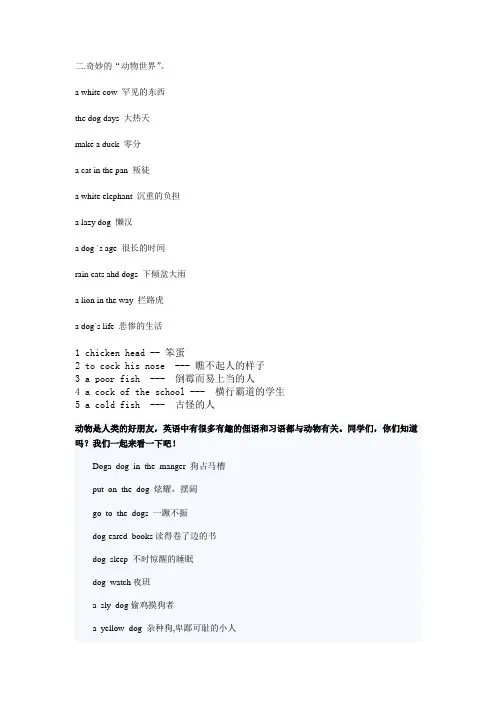
二.奇妙的“动物世界”。
a white cow 罕见的东西the dog days 大热天make a duck 零分a cat in the pan 叛徒a white elephant 沉重的负担a lazy dog 懒汉a dog `s age 很长的时间rain cats ahd dogs 下倾盆大雨a lion in the way 拦路虎a dog`s life 悲惨的生活1 chicken head -- 笨蛋2 to cock his nose --- 瞧不起人的样子3 a poor fish --- 倒霉而易上当的人4 a cock of the school --- 横行霸道的学生5 a cold fish --- 古怪的人动物是人类的好朋友,英语中有很多有趣的俚语和习语都与动物有关。
同学们,你们知道吗?我们一起来看一下吧!Doga dog in the manger 狗占马槽put on the dog 炫耀,摆阔go to the dogs 一蹶不振dog-eared books读得卷了边的书dog sleep 不时惊醒的睡眠dog watch夜班a sly dog偷鸡摸狗者a yellow dog 杂种狗,卑鄙可耻的小人a big dog看门狗,保镖;要人You are a lucky dog! 你真是个幸运儿!dog nose 啤酒与杜松子酒的混合酒a dog in a blanket葡萄卷饼或卷布丁Cat like a cat on hot bricks 非常紧张,象热锅上的蚂蚁set the cat among the pigeons引来可能招惹是非或麻烦的人或事物more than one way to skin a cat 剥猫皮各有巧妙不同(另有办法)rain cats and dogs 倾盆大雨a cat nap 打个盹儿let the cat out of the bag 放出袋中猫(泄漏秘密)Kitty corner 小猫的角落(斜对角)Fishplenty of other fish in the sea海里鱼儿多的很(天涯何处无芳草)fish in troubled waters 浑水摸鱼bigger fish to fry 有更大的鱼要炸(有更重要的事情要办)like shooting fish in a barrel 桶里射鱼(瓮中捉鳖)Birdthe early bird catches the worm早起的鸟才能捉到虫(捷足先登)an early bird 早到或者早起的人a bird in the hand is worth two in the bush一鸟在手胜过两鸟在林birds of a feather flock together羽毛相同的鸟总飞成一群(物以类聚)Horse white horse 白浪put the cart before the horse 车在马前(本末倒置)straight from the horse’s mouth 听马说的(根据最可靠的消息来源)a willing horse 积极工作的人hold one’s horses 等一下,忍耐,控制自己的感情eat like a horse吃得很多beat a dead horse 鞭打死马(徒劳)don’t look a gift horse in the mouth赠马不看牙(收人礼物别嫌好道歹)Bear like a bear with a sore head 易怒的,脾气坏的a bear garden 嘈杂,喧闹的场所或者会议Sheepmake a sheep’s eyes at somebody 傻乎乎地向某人送秋波separate the sheep from the goats 把好人同坏人分开其他:a fly in the ointment 扫兴的人或者事物at a snail’s pace 极慢的a snake in the grass 伪装成朋友的阴险小人rabbit punch (用掌边对某人颈背的)重击a white elephant 无用而累赘之物monkey business 猢狲把戏(胡闹)monkey on one’s back 背上的猴子(难以摆脱的负担)straw that broke the camel’s back压倒骆驼脊梁的稻草(最后致命的一击)when pigs fly 猪飞的时候(绝不可能)a social butterfly 社交蝴蝶(善于交际,会应酬的人)ants in one’s pants 坐立不安bull in a china shop 瓷器店里的蛮牛(笨拙的人)butterflies in one’s stomach 肚里有只蝴蝶(七上八下)like pulling hen’s teeth 跟拔母鸡的牙一样(艰苦不堪)关于马的谚语:You can take a horse to the water, but you can';t make him drink. 策马溪边易,逼马饮水难.A horse may stumble on four feet. 人有失足,马有漏蹄.A running horse needs no spur. 奔马无须鞭策.Don';t put the cart before the horse. 不要把车套在马前.(不要本末倒置.)The common horse is worst shod. 公用之马掌最差.Lock the barn door after the horse is stolen. 失马之后锁马厩.(亡羊补牢.)Hair by hair you will pull out the horse';s tail. 一根一根拔,拔光马尾巴.(水滴石穿.) 关于狐狸的谚语:The fox may grow grey, but never good. 狐狸毛色可以变灰,但是本性难改.(江山易改,本性难移.)The fox preys farthest from his hole. 狐狸捕食,远离洞府.(兔子不吃窝边草.)When the fox preaches, then take care of your geese. 每当狐狸说教,当心鹅群被盗.When the fox says he is a vegetarian, it';s time for the hen to look out. 狐狸说它吃素时,母鸡要注意.有关狼的谚语:Don';t trust a goat with the kitchen-garden, or a wolf withsheepfold. 不能请羊管菜园,不能请狼管羊圈.有关羊的谚语:If one sheep leaps over the ditch, all the rest will follow. 一只羊跨过沟,其它羊也会跟着做.(榜样的力量是无穷的.)有关老鼠的谚语:It is a poor mouse that has only one hole. 狡兔三窟.A speck of mouse dung will spoil a whole pot of porridge. 一粒老鼠屎,坏了一锅粥.有关鸡的谚语:Don';t count your chickens before they';re hatched. 鸡蛋未孵出,先别数小鸡.(不要过早乐观.) 有关兔的谚语:You cannot run with the hare and hunt with the hounds. 不能既和野兔一起跑又和猎狗一起追.(人不应两面讨好.)4. A bird in the hand is worth than two in the bush.一鸟在手胜过双鸟在林。

关于动物的习语在英语学习的过程中,笔者积累了一些包含有动物名称的习语,他们在文章或日常口语中使用的频率颇高,愿与读者共享。
一、与“CA T”有关的习语和词组1、cat-and-dog life(在一起居住者)经常吵架的生活。
They lead a cat-and-dog life, so they decided to separated temporarily.他俩老是吵架,于是决定暂时分居。
2、let the cat out of the bag 无意中泄露秘密,露出马脚。
I wanted mother’s present to be secret, but my sister let the cat out of the bag. 给母亲的礼物我原想保密的,可是妹妹却露了马脚。
3、like a cat in hot bricks像热锅上的蚂蚁;如坐针毡。
He was like a cat in hot bricks before his driving test.他面临驾驶考试,紧张得像热锅上的蚂蚁。
4、play cat-and-mouse game with sb. 作弄某人,忽冷忽热。
Marry dumped her boyfriend because he always played cat-and-mouse game with her. 玛丽跟她男朋友分手了,因为他总是对她时好时坏。
5、put/set the cat among the pigeons 引来乱子、是非或麻烦。
The new security guard is a burglar—that will set the cat among the pigeons. 新来的守卫是小偷——这下子可要鸡犬不宁了。
6、no room to swing a cat 没有(生活,工作等)的足够空间。
There’s no room to swing a cat here. 这里地方过于狭窄。
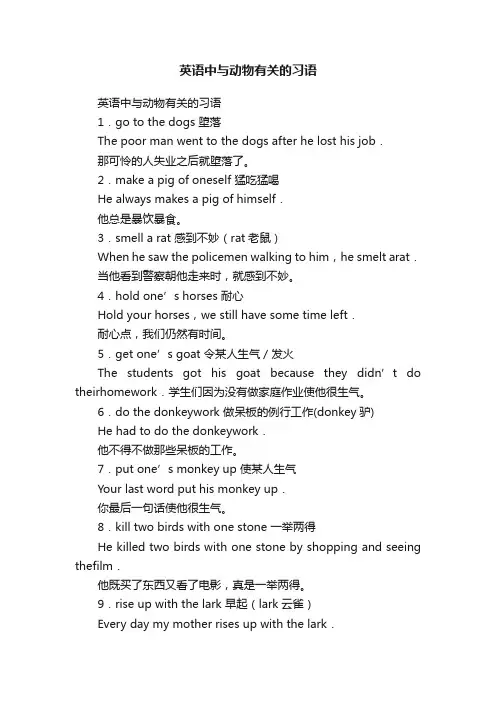
英语中与动物有关的习语英语中与动物有关的习语1.go to the dogs 堕落The poor man went to the dogs after he lost his job.那可怜的人失业之后就堕落了。
2.make a pig of oneself 猛吃猛喝He always makes a pig of himself.他总是暴饮暴食。
3.smell a rat 感到不妙(rat老鼠)When he saw the policemen walking to him,he smelt arat.当他看到警察朝他走来时,就感到不妙。
4.hold one’s horses 耐心Hold your horses,we still have some time left.耐心点,我们仍然有时间。
5.get one’s goat 令某人生气/发火The students got his goat because they didn’t d o theirhomework.学生们因为没有做家庭作业使他很生气。
6.do the donkeywork 做呆板的例行工作(donkey驴)He had to do the donkeywork.他不得不做那些呆板的工作。
7.put one’s monkey up 使某人生气Your last word put his monkey up.你最后一句话使他很生气。
8.kill two birds with one stone 一举两得He killed two birds with one stone by shopping and seeing thefilm.他既买了东西又看了电影,真是一举两得。
9.rise up with the lark 早起(lark云雀)Every day my mother rises up with the lark.我母亲每天都早起。
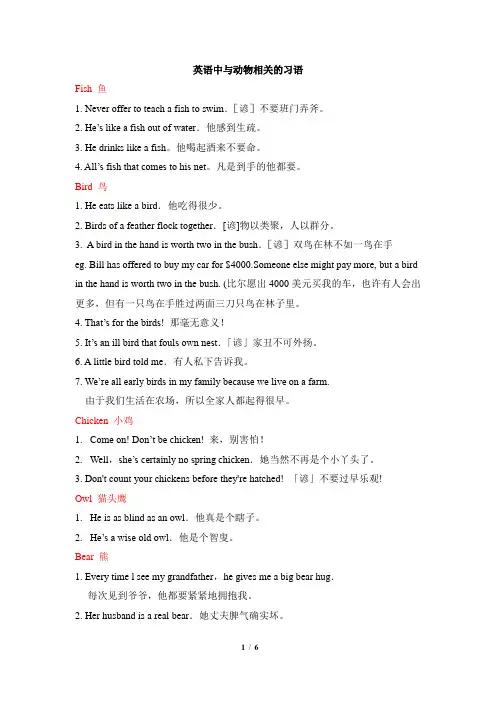
英语中与动物相关的习语Fish 鱼1. Never offer to teach a fish to swim.[谚]不要班门弄斧。
2. He’s like a fish out of water.他感到生疏。
3. He drinks like a fish。
他喝起酒来不要命。
4. All’s fish that comes to his net。
凡是到手的他都要。
Bird 鸟1. He eats like a bird.他吃得很少。
2. Birds of a feather flock together.[谚]物以类聚,人以群分。
3. A bird in the hand is worth two in the bush.[谚]双鸟在林不如一鸟在手eg. Bill has offered to buy my car for $4000.Someone else might pay more, but a bird in the hand is worth two in the bush. (比尔愿出4000美元买我的车,也许有人会出更多,但有一只鸟在手胜过两面三刀只鸟在林子里。
4. That’s for the birds! 那毫无意义!5. It’s an ill bird that fouls own nest.「谚」家丑不可外扬。
6. A little bird told me.有人私下告诉我。
7. We’re all early birds in my family because we live on a farm.由于我们生活在农场,所以全家人都起得很早。
Chicken 小鸡1. Come on! Don’t be chicken! 来,别害怕!2. Well,she’s certainly no spring chicken.她当然不再是个小丫头了。
3. Don't count your chickens before they're hatched! 「谚」不要过早乐观!Owl 猫头鹰1. He is as blind as an owl.他真是个瞎子。
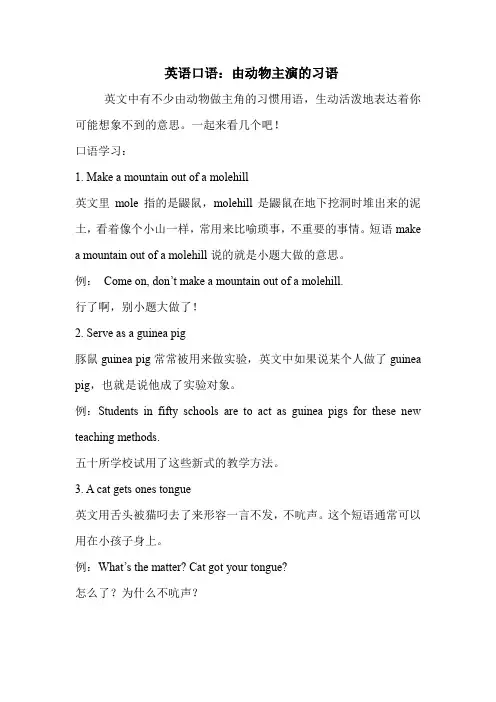
英语口语:由动物主演的习语英文中有不少由动物做主角的习惯用语,生动活泼地表达着你可能想象不到的意思。
一起来看几个吧!口语学习:1. Make a mountain out of a molehill英文里mole指的是鼹鼠,molehill是鼹鼠在地下挖洞时堆出来的泥土,看着像个小山一样,常用来比喻琐事,不重要的事情。
短语make a mountain out of a molehill说的就是小题大做的意思。
例:Come on, don’t make a mountain out of a molehill.行了啊,别小题大做了!2. Serve as a guinea pig豚鼠guinea pig常常被用来做实验,英文中如果说某个人做了guinea pig,也就是说他成了实验对象。
例:Students in fifty schools are to act as guinea pigs for these new teaching methods.五十所学校试用了这些新式的教学方法。
3. A cat gets ones tongue英文用舌头被猫叼去了来形容一言不发,不吭声。
这个短语通常可以用在小孩子身上。
例:What’s the matter? Cat got your tongue?怎么了?为什么不吭声?4. Back the wrong horse这个习语来源于赛马文化。
支持了一匹失利的赛马,也就是下错了赌注,押错了宝。
例:The company has been losing money, and many investors are beginning to feel that they may have backed the wrong horse.公司一直在赔钱,不少投资人开始意识到自己下错了赌注。
5. Cast pearls before swine把珍珠放在猪的面前,猪并不会知道珍珠的珍贵。
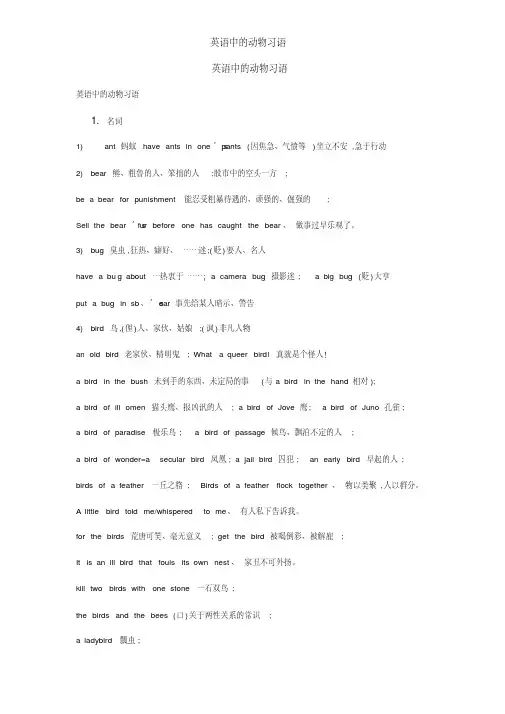
英语中的动物习语英语中的动物习语1.名词1) ant 蚂蚁have ants in one’s pants (因焦急、气愤等)坐立不安,急于行动2) bear 熊、粗鲁的人、笨拙的人;股市中的空头一方;be a bear for punishment 能忍受粗暴待遇的、顽强的、倔强的;fur before one has caught the bear、做事过早乐观了。
Sell the bear’s3) bug 臭虫,狂热、癖好、……迷;(贬)要人、名人have a bu g about… 热衷于……;a camera bug 摄影迷; a big bug (贬)大亨put a bug in sb、’s ear 事先给某人暗示、警告4) bird 鸟,(俚)人、家伙、姑娘;(讽)非凡人物an old bird 老家伙、精明鬼; What a queer bird! 真就是个怪人!a bird in the bush 未到手的东西、未定局的事(与a bird in the hand相对);a bird of ill omen 猫头鹰、报凶讯的人; a bird of Jove 鹰; a bird of Juno 孔雀;a bird of paradise 极乐鸟; a bird of passage 候鸟、飘泊不定的人;a bird of wonder=a secular bird 凤凰; a jail bird 囚犯; an early bird 早起的人; birds of a feather 一丘之貉; Birds of a feather flock together、物以类聚,人以群分。
A little bird told me/whispered to me、有人私下告诉我。
for the birds 荒唐可笑、毫无意义; get the bird 被喝倒彩、被解雇;It is an ill bird that fouls its own nest、家丑不可外扬。
[摘要] 在人类历史发展的漫长进程中,动物一直与人类保持着密切联系,并对人类的生存与发展产生深刻的影响。
这种亲密无间的关系使得人类对动物产生喜爱或同情或厌恶或恐惧的错综复杂的情感,人们也常常借动物来寄托和表达人们的情感,所以在英汉两种文化中都有许许多多与动物相关的词汇。
语言中的词汇反映了文化发展的差异,由于受历史、习俗、价值观念、信仰等诸方面文化因素的影响,英汉两种语言赋予动物词汇以各自特定的文化涵。
本文通过对英汉语动物习语对比研究,探讨两种语言折射出的文化信息的差异。
由于文化差异、审美价值取向差异、社会心理差异、地理环境差异导致中英文动物习语的语义及涵的差异;因此,在跨文化交际环境下,为传达语言准确信息就必须挖掘动物习语所隐含的文化信息。
从而帮助人们顺利、恰当地进行跨文化交流。
关键词:动物词汇;英语;汉语;文化;涵中英文中关于动物习语的对比研究习语是人类文化的积淀,是语言的精华,是表达完整意义、结构定型的短句,是多种修辞、特别是比喻手段的集中表现。
英汉两种语言都以习语丰富而著称,其中动物习语颇丰,有的习语折射出了中英的历史、文化渊源。
动物习语的使用可以使英汉两种语言形象生动、性格鲜明、色彩丰富。
本文将通过研究中英文动物习语在英汉文化中的文化意义异同点;动物词在英汉两种语言中相关文化涵;文化差异、审美价值取向和社会心理的差异的影响;英汉动物习语具体比较;英汉翻译中应该注意语言的文化涵等方面来探讨两种语言折射出的文化信息的差异。
一、同一动物词在英汉文化中的文化意义异同点(一)人类文化的一般进化导致英汉动物习语的共性人类文化的一般进化反映在人类文明发展过程中,就是各民族在生活经历,思想认识上所存在的某些共性。
①这种共性也被称为文化重叠(cultural overlaps)。
在英汉语动物习语中也表现出了许许多多的相似或相同之处。
例如,英汉语中都用公鸡来比喻骄傲(as proud as a peacock),用熊来比喻粗暴的脾气(be like a bear with a sore head),用蜜蜂来比喻勤劳(as busy as a bee),用猴子来比喻淘气、顽皮(monkey with)②,用猪来比喻胖、贪吃(as fat as a pig, make a pig of oneself),用蜗牛来比喻速度缓慢(as a snail’s pace),用鹦鹉来比喻学舌(parrot fashion),用驴来比喻固执、笨拙(as stubborn as a donkey, as stupid as a donkey),用羊羔来比喻温顺(as gentle as a lamb)③等。
论文题目:浅析英语中的动物习语及其翻译技巧白米中学莉摘要本文从英语习语的基本概念和特征出发,指出动物习语在英语中的地位以及易于被误解、断章取义、和原意背道而驰;再从动物习语的主要来源途径;动物习语与文化背景的形成和动物习语的一些特征等几个方面阐述。
从而提出一些基本的动物习语翻译方法和注意事项,借此让学习者更好地把握动物习语的字面意思和真正的含义,以期更好的学好英语。
关键词:动物习语;典故;文化背景;翻译方法一、引言习语是英语的重要组成部分,只要你使用英语,不管是听、说、读、写、译的哪一项,都免不了要接触到习语。
英语语言学家Jennifer seidl 在他的著作——《英语习语和使用》(English Idioms and How to use Them,1987)——的前言里说:“习语和语言是不能分开的,你无法选择要用还是不用。
”可见,习语在英语里是无法回避的。
自然界大约有150多万种动物,丰富的动物资源是大自然赐给人类的物质宝库。
自古以来,动物就是人类狩猎的对象,也是人类赖以生存的物质基础。
随着社会的发展和进步,人类对动物不断进行驯服和饲养,因此关系也更为紧密。
Darryl Lyman(1994)说:动物为人类作了许多贡献,有一项重要的常常被人们忽视的贡献是,动物大丰富了语言。
语言是人类思维和表达思想的手段,是人类最重要的交际工具。
人们在漫长的与动物接触的过程中,从动物的形象、特征、习性中以及人与动物之间的活动等引发许多丰富的想象,并用想象来表达各种各样的思想、感情以及对客观世界的描述,言简意赅、寓意深远。
因此在人类的语言中必然存在大量的含有动物名称的习语。
这些习语有的与动物自然特征相关,有的源自人们对动物习性的认识,有的源自寓言和神话,也有的来自文学作品和民间传说。
在英汉两种语言中,动物可产生相同或不相同的喻义。
动物习语是一定文化背景下的产物,它所反映的词用含义依赖于英汉文化的理解。
鉴于英汉习语的种种差异,通过比较探讨英语习语翻译不失是一种十分有效的途径。
二.奇妙的“动物世界”。
a white cow 罕见的东西the dog days 大热天make a duck 零分a cat in the pan 叛徒a white elephant 沉重的负担a lazy dog 懒汉a dog `s age 很长的时间rain cats ahd dogs 下倾盆大雨a lion in the way 拦路虎a dog`s life 悲惨的生活1 chicken head -- 笨蛋2 to cock his nose --- 瞧不起人的样子3 a poor fish --- 倒霉而易上当的人4 a cock of the school --- 横行霸道的学生5 a cold fish --- 古怪的人动物是人类的好朋友,英语中有很多有趣的俚语和习语都与动物有关。
同学们,你们知道吗?我们一起来看一下吧!Doga dog in the manger 狗占马槽put on the dog 炫耀,摆阔go to the dogs 一蹶不振dog-eared books读得卷了边的书dog sleep 不时惊醒的睡眠dog watch夜班a sly dog偷鸡摸狗者a yellow dog 杂种狗,卑鄙可耻的小人a big dog看门狗,保镖;要人You are a lucky dog! 你真是个幸运儿!dog nose 啤酒与杜松子酒的混合酒a dog in a blanket葡萄卷饼或卷布丁Cat like a cat on hot bricks 非常紧张,象热锅上的蚂蚁set the cat among the pigeons引来可能招惹是非或麻烦的人或事物more than one way to skin a cat 剥猫皮各有巧妙不同(另有办法)rain cats and dogs 倾盆大雨a cat nap 打个盹儿let the cat out of the bag 放出袋中猫(泄漏秘密)Kitty corner 小猫的角落(斜对角)Fishplenty of other fish in the sea海里鱼儿多的很(天涯何处无芳草)fish in troubled waters 浑水摸鱼bigger fish to fry 有更大的鱼要炸(有更重要的事情要办)like shooting fish in a barrel 桶里射鱼(瓮中捉鳖)Birdthe early bird catches the worm早起的鸟才能捉到虫(捷足先登)an early bird 早到或者早起的人a bird in the hand is worth two in the bush一鸟在手胜过两鸟在林birds of a feather flock together羽毛相同的鸟总飞成一群(物以类聚)Horse white horse 白浪put the cart before the horse 车在马前(本末倒置)straight from the horse’s mouth 听马说的(根据最可靠的消息来源)a willing horse 积极工作的人hold one’s horses 等一下,忍耐,控制自己的感情eat like a horse吃得很多beat a dead horse 鞭打死马(徒劳)do n’t look a gift horse in the mouth赠马不看牙(收人礼物别嫌好道歹)Bear like a bear with a sore head 易怒的,脾气坏的a bear garden 嘈杂,喧闹的场所或者会议Sheepmake a sheep’s eyes at somebody 傻乎乎地向某人送秋波separate the sheep from the goats 把好人同坏人分开其他:a fly in the ointment 扫兴的人或者事物at a snail’s pace 极慢的a snake in the grass 伪装成朋友的阴险小人rabbit punch (用掌边对某人颈背的)重击a white elephant 无用而累赘之物monkey business 猢狲把戏(胡闹)monkey on one’s back 背上的猴子(难以摆脱的负担)straw that broke the camel’s back压倒骆驼脊梁的稻草(最后致命的一击)when pigs fly 猪飞的时候(绝不可能)a social butterfly 社交蝴蝶(善于交际,会应酬的人)ants in one’s pants 坐立不安bull in a china shop 瓷器店里的蛮牛(笨拙的人)butterflies in one’s stomach 肚里有只蝴蝶(七上八下)like pulling hen’s teeth 跟拔母鸡的牙一样(艰苦不堪)关于马的谚语:You can take a horse to the water, but you can';t make him drink. 策马溪边易,逼马饮水难.A horse may stumble on four feet. 人有失足,马有漏蹄.A running horse needs no spur. 奔马无须鞭策.Don';t put the cart before the horse. 不要把车套在马前.(不要本末倒置.)The common horse is worst shod. 公用之马掌最差.Lock the barn door after the horse is stolen. 失马之后锁马厩.(亡羊补牢.)Hair by hair you will pull out the horse';s tail. 一根一根拔,拔光马尾巴.(水滴石穿.) 关于狐狸的谚语:The fox may grow grey, but never good. 狐狸毛色可以变灰,但是本性难改.(江山易改,本性难移.)The fox preys farthest from his hole. 狐狸捕食,远离洞府.(兔子不吃窝边草.)When the fox preaches, then take care of your geese. 每当狐狸说教,当心鹅群被盗.When the fox says he is a vegetarian, it';s time for the hen to look out. 狐狸说它吃素时,母鸡要注意.有关狼的谚语:Don';t trust a goat with the kitchen-garden, or a wolf withsheepfold. 不能请羊管菜园,不能请狼管羊圈.有关羊的谚语:If one sheep leaps over the ditch, all the rest will follow. 一只羊跨过沟,其它羊也会跟着做.(榜样的力量是无穷的.)有关老鼠的谚语:It is a poor mouse that has only one hole. 狡兔三窟.A speck of mouse dung will spoil a whole pot of porridge. 一粒老鼠屎,坏了一锅粥.有关鸡的谚语:Don';t count your chickens before they';re hatched. 鸡蛋未孵出,先别数小鸡.(不要过早乐观.) 有关兔的谚语:You cannot run with the hare and hunt with the hounds. 不能既和野兔一起跑又和猎狗一起追.(人不应两面讨好.)4. A bird in the hand is worth than two in the bush.一鸟在手胜过双鸟在林。
浅谈动物中的习语跟汉语一样,英语中有一些有关动物的固定搭配,如果大家可以熟练地掌握,就可以让你的表达纯正地道、妙趣横生。
首先来看猫和狗,它们都是人们生活中常见的动物,生活中的猫咪聪明伶俐,狗狗忠诚顽皮,都深得人们的喜爱,甚至有些人把他们养作宠物,可见阿猫阿狗在人们心目中的地位。
猫和狗的英文表达cat和dog也看起来甚是简单,没什么学问可做,但是你真的完全了解这些词的用法吗?dog comes first。
dog这个单词,在字典中不仅有“狗”的意思,也有其他的引申义,比如在美语俚语中,dog就有”蹩脚货,失败”的意思,请看例句:her last movie was a absolutely dog.意为“她的最后一部影片彻底砸锅了。
”;在美语俚语中,dog还有另外一个意思是“丑女人”,就相当于汉语中的“恐龙”了;此外,dog还有“无赖,家伙,小人”的意思,比如“ you dirty dog.”可以翻译为“你个下流坯!”dog不仅有丰富的含义,而且还能构成许多的习语表达。
来看看你掌握了多少吧!①dog eat dog, 这里可不是“狗吃狗”的意思,而是引申为“残酷无情的竞争,损人利己的角逐”,请看例句,we are living in a dog-eat-dog world. 翻译过来就是“我们生活在一个竞争残酷的世界里。
”② a dog’s breakfast/dinner, 一条狗的早餐/晚餐?意思可没有那么简单,这个习语通常用来表达“乱七八糟,一团糟”的意思,比如 he’s made a real dog’s breakfast of these accounts. 意为,他把这些账目简直搞得一团糟。
③ a dog’s life, 一条狗的生活?是幸福还是悲哀呢?那些说宁愿做一条看门狗来远离当代社会激烈竞争的人们可能要失望了,这个短语的意思是“悲惨的生活,牛马不如的生活”,看来狗狗的生活也是蛮不容易的。
妙趣横生的动物习语英语习惯用语英语中也有许多与动物相关的习语、谚语和典故,它们生动而又贴切,精巧而诙谐,彰显着西方文化和民俗中的智慧与风情,英语因之变得面目可亲、妙趣横生。
今天我们就来看看英语中一些有趣的习惯用语。
dog1. Love me, love my dog. 爱屋及乌“爱屋及乌〞,说明狗已经被当成和人一样的家庭成员来对待了。
2. Every dog has his day. 人人皆有得意时I have seen ordinary people suddenly become important. This is a case of every dog has his day.我曾经看过普通人突然之间成了大人物的情况,这就是所谓“人人皆有得意时〞。
“三十年河东,三十年河西〞,“风水轮流转〞也可以表示不太好的意思。
比方,某人考试作弊却没被教师发现,因此得了高分,许多人知道以后都愤愤不平,觉得很不公平。
可是,下面这个人就很看得开,他说:Don’t worry about her. Every dog has his day. She will eventually suffer f or all the bad things she is doing.不要管她。
每个人的那一天总会降临的。
最终她会为她如今所作的坏事付出代价的。
所以,every dog has his day完好的意思应该是每个人都有那个他该得到的时刻。
这个时刻也许是好, 也许是坏。
这个习语也可以说成every dog has its day,意思是一样的。
3. to be in the doghouse失宠或遭受困难字面上看就是把一个人放进狗窝,而实际的意思就是失宠或遭受困难外国人是很爱狗的,通常把狗养在家里与孩子一起,当做家庭一分子。
假如父母对狗不好,就把狗赶到外面的犬舍〔doghouse〕里,不准再进家里。
所以这句习语,后来也有一种处分或冷落的意味。
动物类谚语和习语Barking dogs do not bite.吠犬不咬人The best fish swim near bottom.好鱼居深渊To kill two birds with one stone.一石二鸟To ride the tiger.骑虎难下To shed crocodile tears。
掉鳄鱼眼泪Dog doesn’t eat dog。
虎毒不食子If the shepherds quarrel, the wolf has a winning game.鹬蚌相争,渔翁得利Love me, love my dog。
爱屋及乌A lion in the way.拦路虎A rat in a hole。
瓮中之鳖As wet as a drowned rat.湿如落汤鸡Like a cat on hot bricks.像热锅上的蚂蚁When the cat is away,the mice will play。
山中无老虎,猴子称大王To lock the stable door after the horse is stolen.亡羊补牢Better a living dog than a dead lion。
好死不如赖活着Birds of a feather flock together。
物以类聚,人以群分It's an ill bird that fouls its own nest.家丑不可外扬To beard the lion in his den.太岁头上动土The best fish smell when they are three days old。
久住招人嫌Fish begins to stink at the head。
上梁不正下梁歪Fight dog, fight bear。
不获全胜不收兵The cat shuts its eyes when stealing cream.掩耳盗铃The leopard can’t change its sports.本性难移May as well be hanged for a sheep as a lamb。
英语中的动物习语汉语中有许许多多幽默精炼、言简意赅的俗语谚语,它们的存在使我们平时对话更加生动有趣,使中华文明更加意蕴深长。
英语,世界上应用最广泛的语言,以它自身独有的魅力征服了七大洲。
不仅是众多西方国家的官方语言,在非英语国家,它作为重要的第二语言被越来越多的人们学习研究着。
这其中,有许多活泼的习语增加了英语的表达效果,体现了西方文化特点。
在诸多英文名篇中,因为有了习语的点缀,作品更加令人回味。
动物是人们日常生活中不可缺少的一个组成部分,论是乡间役使的牛马还是都市豢养的宠物,都与人们须臾不离。
语言作为社会文化的一个组成部分,自然不可能免受影响。
英语中的动物习语鲜明地突出了动物的特点,精炼而深刻。
以下,就是我收集的动物习语:Fish 鱼1.Never offer to teach a fish to swim.[谚]不要班门弄斧。
2.He’s like a fish out of water.他感到生疏。
3.He drinks like a fish。
他喝起酒来不要命。
4.All’s fish that comes to his net。
凡是到手的他都要。
Bird 鸟1. He eats like a bird.他吃得很少。
2. Birds of a feather flock together.[谚]物以类聚,人以群分。
3. A bird in the hand is worth two in the bush.[谚]双鸟在林不如一鸟在手eg. Bill has offered to buy my car for $4000.Someone else might pay more, but a bird in the hand is worth two in the bush. (比尔愿出4000美元买我的车,也许有人会出更多,但有一只鸟在手胜过两面三刀只鸟在林子里。
4. That’s for the birds! 那毫无意义!5. It’s an ill bird that fouls own nest.「谚」家丑不可外扬。
6. A little bird told me.有人私下告诉我。
7. We’re all early birds in my family because we live on a farm.由于我们生活在农场,所以全家人都起得很早。
Chicken 小鸡1. Come on! Don’t be chicken! 来,别害怕!2. Well,she’s certainly no spring chicken.她当然不再是个小丫头了。
3. Don't count your chickens before they're hatched! 「谚」不要过早乐观!Owl 猫头鹰1. He is as blind as an owl.他真是个瞎子。
2. He’s a wis e old owl.他是个智叟。
Bear 熊1. Every time l see my grandfather,he gives me a big bear hug.每次见到爷爷,他都要紧紧地拥抱我。
2. Her husband is a real bear.她丈夫脾气确实坏。
Bee 蜜蜂1. She’s always as busy as a bee.她总是忙忙碌碌。
Snail蜗牛1. He walks at a snail's pace.他走路慢吞吞。
worm 虫1. He wormed his way through the narrow passage.他好不容易才走过那条狭窄的小路。
2.Every time l take the kids to the movies,they always worm around in their seats.每次我带孩子们去看电影,他们好像总也坐不住似的。
3. l am a worm today.今天一点精神也没有。
4. A worm will turn.[谚]如果被逼太甚,最温顺的人也会反抗。
Ants 蚂蚁1. Y ou’d think he has ants in his pants.你会觉得他坐立不安。
Bug 臭虫1. It really bugs me when the bus comes late and l can’t go to work on time。
由于汽车晚点而不能按时上班,真让我感到烦恼。
2. l don’t feel well.I think I picked up some kind of bug in my travels abroad.我感觉有点不适,可能是出国旅行时偶染微恙。
3. He’s a camera bug.他是个摄影迷。
hog 猪1.When we were young,my sister and l shared the same bed,but she usually hogged all the room.小时候姐姐和我共睡一张床,可她总是占很多地方。
2.When he does something,he usually goes the whole hog.他要干什么,就真的干到底。
Sheep 羊1.She had a rather sheepish smile. 她笑起来很害羞的样子。
2.He is a black sheep 他是个败家子。
dog 狗1. Barking dogs seldom bite.吠犬不咬人(意指:对于高声发出恐吓,或惯于大声吼叫的人,勿须当真)。
2. Every dog has his day.凡人皆有得意日(意指:大家都有走运的一天)。
3. Dog does not eat dog.同类不相残;同室不操戈。
4. a cat-and-dog life 争争吵吵的日子5. Dog does not eat dog.同类不相残,同时不操戈6. Dumb dogs are dangerous.不叫的狗咬人7. Give a dog a bad name and hang him.谗言可畏,欲加之罪,何患无辞8. go to the dogs每况愈下9. hang-dog look愁眉苦脸10. If the old dog barks, he give the counsel.老狗叫,是忠告。
11. Love me, love my dog.爱屋及乌12. He is a lucky dog.他是个幸运儿。
13. lead a dog's life过穷困潦倒的日子14. not have a dog's chance毫无机会15. come like a dog at a whistle一呼即来16. Every dog is a lion at home. [Every dog is valiant at his own door.][谚]狗是百步王, 只在门前凶。
17. Fight dog, fight bear.[谚]打个青红皂白, 一决雌雄。
18. Give a dog a bad [an ill] name(and hang him).[谚]一旦给人加一个坏名声, 他就永远洗刷不掉; 人言可畏。
19. It is ill to waken sleeping dogs. [let sleeping dogs lie; don't wake a sleeping dog.]别多事, 别惹麻烦。
20. lead a dog's life过着牛马不如的生活22. Love me, love my dog.[谚]你若把我当朋友, 也要把我的朋友当朋友; 爱屋及乌。
Scornful[Hungry] dogs will eat dirty puddings.[谚]人到危急时, 平时所不屑做的也要做; 急不暇择, 饥不择食。
teach an old dog new tricks使守旧的人接受新事物teach the dog to bark教狗怎么叫(意指多此一举)The dog returns to his vomit.狗回头吃自己吐出来的东西; 重犯旧日罪恶。
A living dog is better than a dead lion.一条活狗胜过一头死狮.Horse 马1. He eats like a horse.他吃得很多。
2. That’s just a lot of horse and donkey dust! 那不过都是些废话!3. It’s time to study now and stop horsing around.学习时间已到,别胡闹了。
4. I got it straight from the hor se’s mouth.我是听当事人亲口说的。
5. Just hold your horses!忍耐一下吧!6. She works like a horse all day long.她整天辛辛苦苦地干活。
7. That’s a horse of a different color! 那完全是另外一回事。
8. You can take a horse to the water,but you can't make him drink!谚]带马到河边容易, 逼马饮水难!Monkey 猴1. Don't get your monkey up for nothing.别无缘无故生气。
2. You shouldn't monkey about with that machine, if you don't know how to fix it.假如你不懂得修,就别瞎弄这台机器。
3. What kind of monkey business has been going on while I've been away?我不在的时候,出了什么事了?Fox 狐狸1.Watch out for him.He’s an old fox.防着点儿,他是只老狐狸精。
Mule 骡He's more stubborn than a mule.他顽固得很。
Cat 猫1. to rain cats and dogs意思为滂沱大雨.西方人认为帽可以预测天气变化,所以帽被看成大雨的象征.而狗是风的使者,所以两者相遇时可以想象.2. curiosity killed the cat译为不要太过好奇.猫有一个很危险的习惯-用鼻子接触所有的东西,如同过于热心的人容易引起别人的反感.Children are usually warned that curiosity killed the cat.3. to let the cat out of bag意为泄露秘密,源于乡村盛行的骗术,人们用猫代替猪放在口袋里到市场上卖,如果猫从口袋里跑出来了,秘密泄露则骗术失败.Do not tell Anna about our plot, or she always let the cat out of the bag .4. A cat has nine lives. [谚]猫有九命。